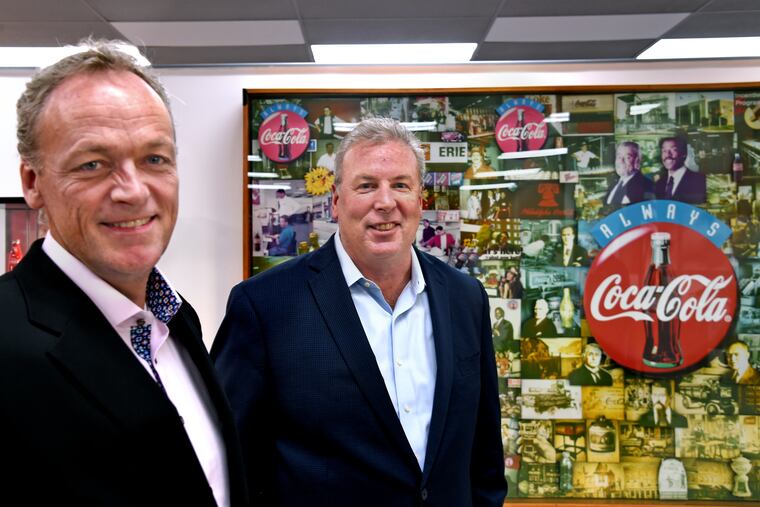Liberty Coca-Cola bottling execs talk soda, taxes, and tea, and how to make their messages resonate in Philly
Once co-owned by 76ers great Julius Erving and now-disgraced comedian Bill Cosby, Liberty passed back to Coca-Cola, which sold it to locally based executives in 2017.

Outside the Liberty Coca-Cola Beverages warehouse in North Philadelphia, rows of signature red-and-white-logoed trucks are parked in a fenced lot. Inside, workers on beeping forklifts fetch palettes of soda as the machinery thrums – conveyor belts and equipment that envelops those palettes in shrink wrap.
Stacks of two-liter bottles – Fresca, Cherry Sprite, Dr. Pepper – wait to be delivered to stores and other customers that buy from the bottling franchise for one of Coca-Cola’s biggest markets. The distributor’s hyper-diverse swath of territory is home to 28 million people, covering Philadelphia and New York City, and reaching from Delaware to Connecticut.
“We need to figure out a way of communicating in Spanish, Mandarin, Korean, Philly, and Irish,” says Paul Mulligan, the Dublin-born co-owner, with Philly-native Fran McGorry, of the franchise. It might sound jokey, but he’s serious: “Philly talks in a certain way – and how do you connect ... in a way that gives people goosebumps?”
Once co-owned in part by 76ers great Julius Erving, the bottling business passed back to Coca-Cola, and corporate sold it back to local control in late 2017, part of the company’s decade-long effort to return all of its U.S. bottling operations to locally controlled franchises. Of Liberty’s 4,100 employees, 700 work at its Philly production and distribution facilities at 725 E. Erie Ave., which makes up 4 percent of the city’s manufacturing employment, the company says. In its first year in business, the new franchise had $1 billion in revenue. (Liberty does not disclose operating income.)
Mulligan and McGorry know this territory well. They are Coca-Cola veterans, with a combined 55 years of experience across Coke operations. But they also started Liberty at a time when revolts against sugary beverages have led to changes from City Hall to the boardroom: There is Philly’s tax on sugary and diet drinks – which Mulligan and McGorry do not like – and the multiplicity of products that the company has rolled out – more than 500 globally in 2017 – which they do like.
All these choices, some with reduced or no sugar, are part of a strategy that Coke chairman and CEO James Quincey, who took over in May 2017, calls “beverages for life.” That pertains to soda, for sure – Coke Zero Sugar launched in 2017 – but also coffee, tea, energy drinks, and water in flavored, plain, vitamin, and sparkling varieties.
But let’s talk ready-to-drink tea for a moment, because it is far more popular in Philadelphia and Liberty’s northeastern U.S. territory than it is in the rest of the country, by a ratio of 3-1 in sales, according to Mulligan and McGorry. And tea isn’t just “tea,” of course, but a portfolio of brands for tastes that run from organic to premium to mainstream.
Liberty’s job – as Coca-Cola’s conduit to this corner of the world – is “how to take a global strategy like tea, and dial it up and invest more in our market, because consumers have advanced more into that category,” Mulligan said.
He and McGorry were seated in a conference room a few hallway turns from the warehouse floor, each with an open 7.5-ounce mini-can of Coke Zero in front of him. Within sodas – technically, the “sparkling segment” – Fanta does much better in the Bronx than in Manhattan, while ginger ale “way over-indexes” for popularity in Philadelphia.
“Even brands like Coca-Cola Zero Sugar are double-digit growth for us,” McGorry said. “We’re purposefully out there promoting it. We were one of the first bottlers to expand our mini-cans,” he said, reaching for the 7.5-ounce mini-can in front of him. “The consumers love the mini-can.” It is the only size – “the perfect size” – that is bought in the McGorry household.
The tone shifts when it comes to discussing the soda tax. In 2016 Mayor Jim Kenney signed the 1.5-cent-per-ounce levy on sweetened drinks and diet versions among them, pledging the funds to expanded pre-kindergarten and parks. “Our business in this market is down 15 percent in total,” McGorry said, adding: “That’s less money in resources that we have to invest in the community, which just hurts everybody, really."
Liberty’s co-owners refer to “community” a lot. One initiative they started was to appoint employees to serve as “ambassadors," as part of their day jobs, to sit on community boards and lead efforts on community affairs. And last year, Liberty donated to 19 organizations and events in Philadelphia. The distributor made nearly $80,000 in contributions, sent out volunteers, and provided beverages, such as 50,000 championship cans to celebrate the Eagles' Super Bowl win.
Recipients included the Police Athletic League of Philadelphia and the city’s NAACP chapter as well as causes supported by politicians who have criticized the soda tax. Liberty donated $5,000 to a Thanksgiving food drive put on by City Councilwoman Maria Quiñones-Sánchez, who voted against the tax and has argued that it’s a regressive measure that falls heavily on “poor communities of color.”
Liberty said it donated eight Adventure Aquarium tickets for a raffle at a breast cancer awareness event held by two Philly Democrats -- State Rep. Angel Cruz and State Sen. Christine Tartaglione. Cruz argued that the tax was unlawful in an amicus brief before the state Supreme Court last year. (The court upheld the tax.)
“Just putting a regressive tax on soda, we don’t think it’s optimal,” Mulligan said. And if there’s a “societal issue,” he said, then Coca-Cola wants to be part of coming up with a solution.
After all, Mulligan said, they’re building a business to last for as long as Coke has already been around, in a territory that’s “the greatest franchise in the world."